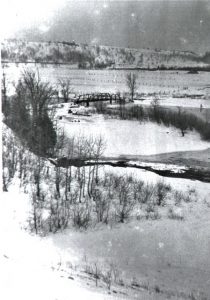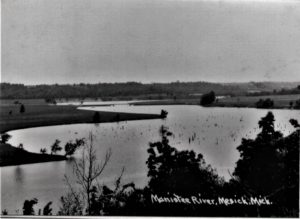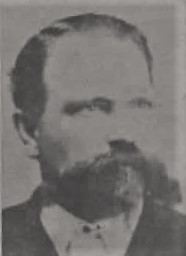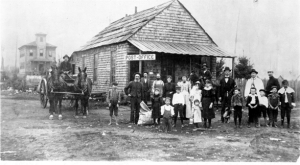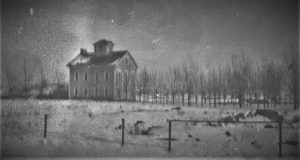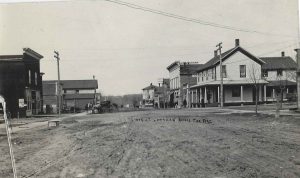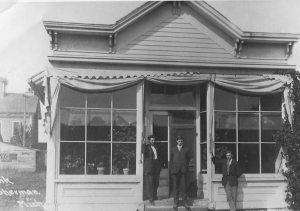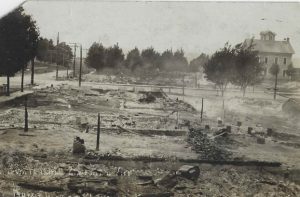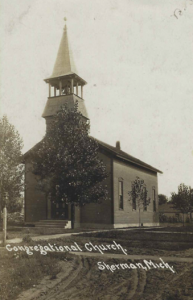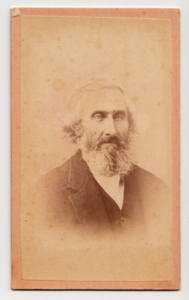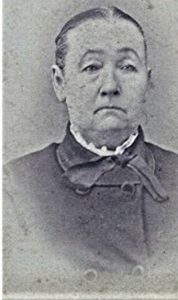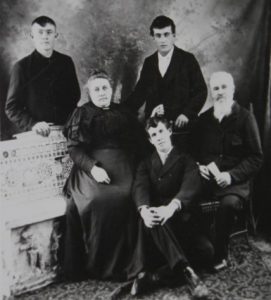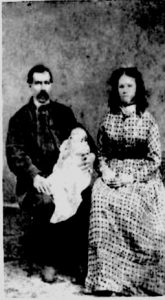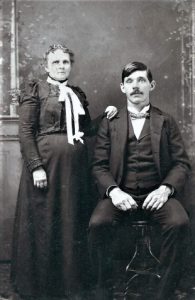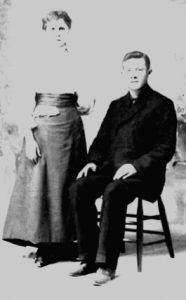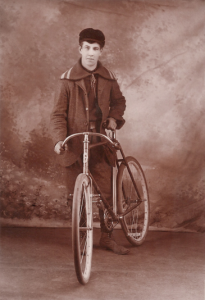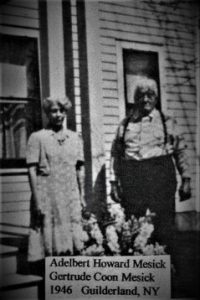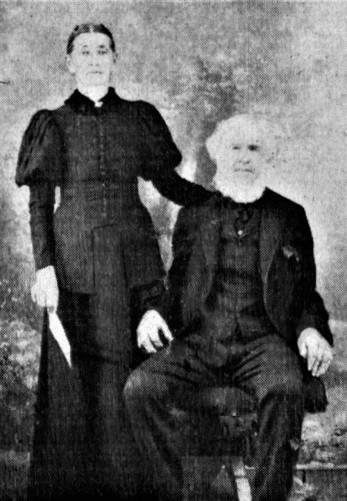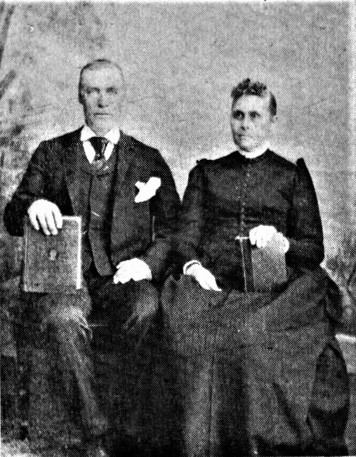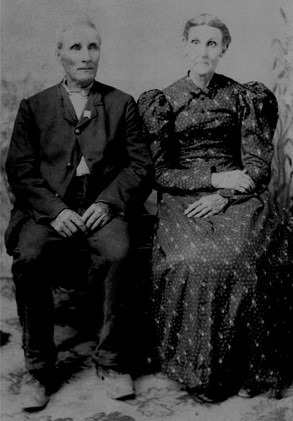In order to learn about a village named Mesick, we will have to go back and share the history of some of the settlements in Wexford County that relate to the village of Mesick and its people. Historians have written that the “warlike” Chippewa, the “peaceful and intelligent” Ottawa, and the “fire keeping” Potawatomi, all the large Algonquin Nation, were the predominant tribes when the area of Kautawaubet Territory, said to be a Potawatomi word that has been translated as “broken tooth” or “land of water” was created on April 1, 1840. The area that was to become Wexford County was included at different times as a part of Michilimackinac, Mackinac, Ottawa, Grand Traverse, and Manistee counties. The County was renamed Wexford on March 8, 1843.
The first settlement recorded in our area was called “Manistee River Bridge” and rightly named as it was located on the south side of the Manistee River on the State Road that was being built in 1860 from Newago to Northport crossing Wexford County and the Manistee River by 1863. The settlement only lasted for a short time before moving south 1/ 2 mile and was then called Sherman after William Tecumseh Sherman the famous Civil War General after the Civil War.
Sherman a village set in the middle of four townships: Wexford, Hanover, Springville, and Antioch, with the State Road being the chief road through the middle. It is said that B.W. Hall and Dr. John Perry were the first pioneers to arrive in 1863 to settle here, with Dr. Perry eventually becoming the 2nd postmaster. Post offices and railroads were the cause of the success of most settlements. If the government saw it fit to have a post office installed, and many come and went in a short time, longevity seemed to be the criteria for success.
With the State Road opening and the passing of the Homestead Grant Act, pioneers began arriving in Wexford County as soldiers sought their fortune. It was deemed as good farmland here, so it was pursued by many. Consequently, Wexford Corners was the first area to build a school.
When pioneers were traveling north on the State Road in search of homesteads, we find the Aaron Baker family coming to search for land. Aaron enlisted in the Union Army at age 39 during the Civil War. The term of enlistment began on November 9, 1861. A daughter, Leafy, was born two weeks later. Aaron served in the 29th Ohio Infantry, Company “C” for two years. While in the service, two of his sons, George, and John, passed away. After contracting an illness in the Army, Aaron was given an honorable discharge on July 20, 1863. In late 1863, Aaron moved his family from Ohio to Wexford County, MI.
The family’s trip was made by a covered wagon pulled by oxen. Aaron was still so ill he had to make the entire trip lying down. They took up residence on 160-acre-plot 2 miles south of Sherman, on the State Road in a temporary shack of boughs. When Aaron recovered, he built a better and larger boarding house to help other settlers on their way north. Once in Springville a son, Howard Aaron Baker was born July 29, 1864, who claimed the fame of being the first Caucasian boy child to be born in Wexford County. Another boy, Alvin E. Baker was born to the Bakers in 1869. Other children born to the couple before their arrival in Springville were: Ethelinda M Baker 1843, Martha E Baker 1845, Lyman Herman Baker 1848, Eleanor E Baker 1850, Mary C. Baker 1853, Lucy A Baker 1855, and Leafy O. Baker 1861.
At the time when the Baker family arrived in Wexford County another young man and his brother, Howard and Walter Mesick, orphans so to speak, arrived on the scene. Born in Canada, where their father died, their mother moved Howard age 9, Walter age 13, and the family back to New York. Howard Mesick shared the following about that time in his life with his granddaughter, Vera, Eleanor Isabell (Mesick) Ward.
“Mother let some of the neighbors have Walter and me for the work we could do. Neither Walter nor I liked the places she chose, so in a short time, we ran away. When starting we had good clothes, but nothing to eat and no money.
‘We stood the hunger as long as possible then we went to a house to get something to eat. Nobody was in the house. (Later we found they were all in the garden.) So, seeing a whip standing in one corner of the house, we took it and started for the road just as a man was driving by. We asked him if he wanted to buy a whip, he answered, “yes” and threw a sixpence down. We tossed him the whip and he drove on. We searched for several minutes in the sand where he threw the money and at last, we found it. We continued down the road looking for something to eat.
‘Finally, we came to another house where we stopped and purchased a loaf of bread. From there we went to a lumber pile where we climbed to the very top to divide and eat our loaf of bread. No sooner had we divided it when Walter went tumbling to the ground; the worst of it all was a pig pen was below and whatever became of the bread no one knew.
‘A few days later our uncle came and tried to find us to give us some money. However, another man who was with our uncle wanted to take us back home. Upon hearing about this, we boys got a jump start on them and boarded a ferry boat working for our fare across the canal. Once again, we were quite a distance from home with nothing to eat and no way of getting anything. So, we started trapping and hunting.
‘This remained our work until we were young men. By then the war between the North and South was raging. Both of us were drafted but it so happened we were so far into the woods that we were left alone to fight animals instead of men. We made fast friends with the Indians since our camps were near them. Of course, we had enemies among the Indians the same as the Indians had among themselves. One day when we were out working the enemy Indians came to our camp and stole $1,800 worth of fur and burned our shanty.
‘Altogether this did not discourage me for the next year, 1866, I married Eleanor Baker. But it didn’t scare the Indians, they came to visit just as much. One day while an old Indian was at our home, he stayed to get a square meal, as he called it. So, while waiting for dinner he spied a large pan of custard on the table. He went over and began eating it and exclaimed “pretty good I like em.” Then eating a little more, he again said, “pretty good I like em how you make it”? This he kept up until the pan was empty before Grandma noticed what he was doing.” Evidence of Native Americans’ friendship with the settlers is verified by Howard’s conversation with his granddaughter.
Howard Mesick has always been given credit for the town being named after him. However, Walter arrived in Mesick with his brother and married another of the Baker girls, Mary. Their first child Minnie Mary (1870-1872) died early on. Mary died on September 18, 1873, after the birth of their second child Ettabelle (1873-1956). Ettabelle was sent to her Baker grandparents who were living in Jamestown, Nowata County, MI, at the time. Walter eventually moved closer to his daughter and the Baker grandparents where he lived out his life.
A third Mesick brother, rarely spoke of was Jesse who also married one of the Baker sisters. Lucy. Jesse served in the Civil War 82nd New York Infantry, Co. U; age 18 years. He enlisted at Poughkeepsie, New York, to serve three years and mustered in as a private, on August 1, 1864; transferred from 82nd Infantry to Co. G, 59th N.Y. infantry, July 10, 1864; wounded, November 5, 1864; Jesse spent time in a prisoner of war camp in the last six months of his enlistment before mustering out on June 30, 1865, at Munson Hill, VA.
The 1880 census records the Jesse Mesick family living in Springville, Wexford, MI working as a farmer. Nine children were born to this Mesick family: Charles 1875, Clarissa 1879, Jesse Herbert 1884, Frances Celia 1886, Leafy 1888, Aaron 1890, Roy 1892, Pansy 1897, and Lela 1900. The 1900 census finds the family in Salem, Allegan County MI. Salem, Allegan MI is where Jesse lived out his life as a farmer, passing away on October 6, 1916. Lucy (Baker) Mesick died on December 1, 1923.
Gallery
